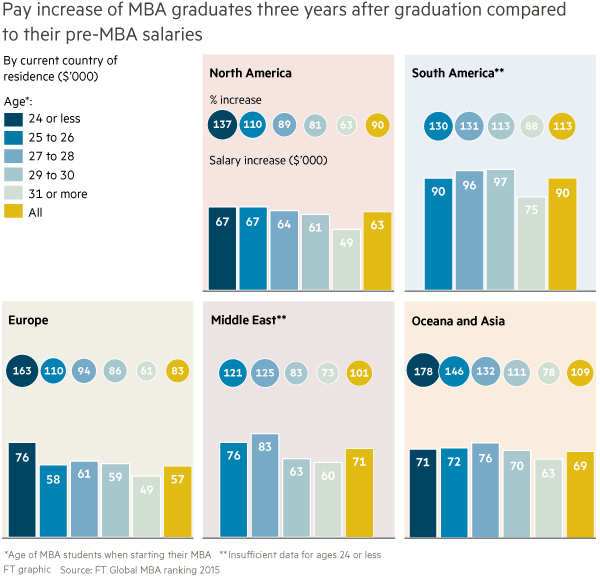MBA by numbers: Return on investment
Simply sign up to the Business education myFT Digest -- delivered directly to your inbox.
If money is your motivation for studying for an MBA, then the earlier you enrol on your degree programme the better.
Data from the Financial Times 2015 Global MBA rankings show that the pay increase of younger graduates in the three years after graduation outperforms that of their older counterparts in both percentage terms and absolute terms.
The rankings are based on a survey of the MBA class of 2011 and analyses their career progress and salaries.

Participants aged 24 or under when they started their degree saw their salary increase by nearly $69,000 in the three years after graduation, up 145 per cent on their pre-MBA salary. Their older counterparts, those aged 31 or above, had a pay increase of $56,000, or a 70 per cent increase.
Those in the middle age group, who were 27 to 28 years old when they began their full-time MBA, had a pay increase of $67,000, just about doubling their pre-MBA salary.
Broadly speaking, the same pattern occurs in all industry sectors and countries, regardless of whether graduates work overseas or move to a different industry.
On average three out of four respondents to the FT survey were aged between 25 and 30 when they started their MBA, while 21 per cent were 31 or above and the remaining 4 per cent were 24 or younger. The older the participants were, the more likely they were to enrol in one-year European MBA programmes as opposed to two-year US-type MBA programmes. On average, 75 per cent of those aged 26 or under attended two-year programmes in comparison to only 43 per cent of those aged 31 or above.
An MBA is a substantial investment, regardless of your age. The average cost is $90,000 for fees and required expenses, before considering the opportunity cost of a full-time programme. For the traditional two-year MBA the cost is around $97,000, compared with $80,000 for a one-year degree.
Although all participants expect a return on investment, the main motivation of participants changes as they get older. While the younger participants are primarily motivated by salary, the more senior ones want to develop their managerial skills. Those aged 27 to 30 wish to achieve both.
MBA programmes have lost some of their shine and applications are falling, but the best degrees still allow participants of different ages and backgrounds to achieve their goals. Nearly three-quarters of those aged 31 or above achieved their main ambition, which was to be promoted to senior positions.
Overall, 95 per cent of graduates reported they had achieved their goals, be it to earn more money or become a better manager.
Comments